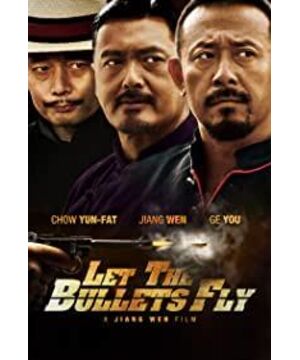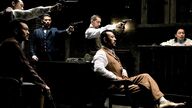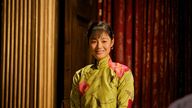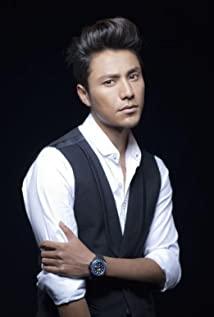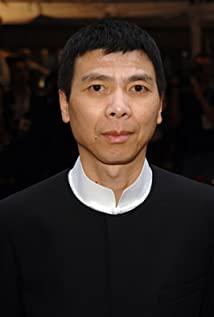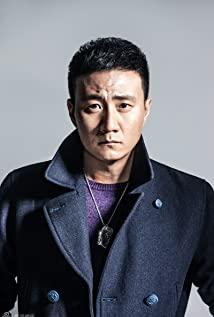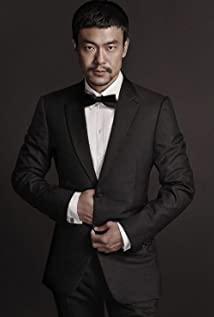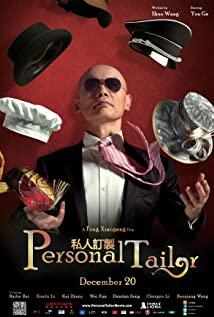(Written at the theater, some memories may be different from the original film, and I can't remember the fast pace later, only the opening part) The natural law of all art comes from comparison. In the title of "Let the Bullets Fly", the camera pans horizontally and vertically from the mountain to the flat, which is the stillness of the picture; the back of the old sixth's head suddenly enters the frame, leaning his ears to the rails to listen to the sound, turning his head to show the audience a close-up of his face, It is the movement of the picture; the ethereal children's voice singing "Farewell" in the air is the stillness of the atmosphere; the sound of an axe smashing into the railroad tracks, the horse's hoofs galloping in the distance, and the train screeching out of the dust and mist, it is the movement of the atmosphere; Lao Tang, The master and the county magistrate’s wife were singing and eating hot pot in the train. The audience’s psychological need at the moment was quiet; The war is about to break out, and the audience's psychological expectation is moving; when the guns are fired and the bullets are missing, there is a voice-over voice of questioning "missed?!" The audience thought that the game was broken, quiet. The director put his fists on his chest, which is better than walking in the courtyard. "Let the bullets fly for a while." So we are also waiting for a while? Very quiet. George Pearson once said that "two minutes of silence is important in any film," and the bullet's flight, when it reaches those two minutes of silence, is also the greatest moment in the film. In the drama, he stopped the audience's urgent and vulgar routine needs abruptly. In terms of the audience's psychological expectations, it is the dramatist's duty to explain the unreasonable things reasonably. He must respect and provoke the audience's intelligence. The analogy is that the acrobat makes a flaw when walking a tightrope, pretends to fall, the audience shouts, and when he holds his breath again, the actor stands up tremblingly. The explanation of the film is obviously more complicated. The bullet hits the reins, the horse-drawn train continues to move forward, and when the rope pulls and breaks, the dramatic tension is at its extreme. in control. From the turbulent atmosphere to the action of mercury pouring down the ground, in just a few minutes, the heart was lifted up and down, exclaimed and swallowed, and the soundtrack of "The Sun Also Rises" sounded in my ears again. Last year The train went from that screen to this screen. Some people say that Jiang Wen used Hisaishi twice to save money, but I think it is very likely that this soundtrack has been in the director's mind for a year. There are pictures, and finally there is drama. The soundtrack and the picture at this time, although the rhythm is closely matched, they each enter a different ideographic space in terms of feeling. In the picture, guns are fired, horses are running, trains are rolling, Zhang Muzhi and horse bandits are swaying in the light and shadow The wind is galloping in the woods of the slaughter, and in a killing in the autumn scenery, the image is publicity, conflict, group, and unscrupulous, and the soundtrack uses a trumpet that is closer to the horn to play the main melody, the tone is melancholy, and the light dotted notes are used. , the use of the musician's soft articulation skills, and occasionally reveal a restrained joy. After the percussion and string parts are added, the carnival begins, and the soundtrack is still restrained, romantic, and more personal. In the use of this sound and picture counterpoint, the killing scenes in broad daylight are romanticized by music, and the expression of personal emotions is still permeated in the group's actions. The times are bizarre and absurd. He can only choose how he fits into the times. Zhang Muzhi has the official seal (regime) snatched on the road in one pocket, and the military power (military power) in the other. He is a bandit who gathers in the mountains and forests, wearing a hunter's melon skin cap, and a low-level officer under the rule of Cai E. . Wearing a bunt military uniform in that era, on the whole, represented a progressive-minded warlord who liked to molest women and listen to Mozart's music. Huang Shilang, who speaks English and can earn US dollars, is a smuggler who sends Chinese to the United States to build the Western Railway. He is also a local tyrant who colluded with the government to exploit the people and then blackmailed them. He also studied the samurai sword cutting ceremony. Dressing in a completely Western fashion, or having the experience of wandering from the West, the East, or the South, in fact, that is the kind of life that Zhang Muzhi hopes his adopted son, Liu Liu, will experience. Studying abroad was clearly supported by progressive warlords (such as Zhang Mu) at that time. The Beiyang government still sent out public students during the turbulent years, and Beiyang officers also had the habit of studying abroad in military academies. And Huang Shilang apparently became a comprador representative in the village of fish and meat relying on foreign countries. Lao Tang, judging from his clothes, wears traditional Chinese robes and jackets, but wears a Western hat on top of his head. He is well-versed in Chinese-style killing hearts. He knows the U.S. dollar and has a wide range of contacts. For characters with shoulder-length hair, the hair has no layers, but is cut all at once. This kind of hairstyle, forced to cut braids in the early days of the revolution, will leave such a section of the Manchus, old and young, but it is more likely to refer to the identity of a speculator. A republic and democracy, suddenly the restoration of the royal family, and suddenly the establishment of a constitutional monarchy, whether this blue silk should be kept or not, and for whom it should be kept, remains to be seen. So his identity is vague and unclear at all, as shown in the film, can't believe what a liar said, can't even believe him talking about his first love. Women are too flat in this film. Jiang Wen has always put women in the position of being admired in the film. Although this male-dominant perspective has caused dissatisfaction among feminists, I like it very much. Jiang Wen likes to let women show their own Sexual charm, showing the wild, impulsive, and reckless side of women, and Sister Hua pointed a gun at her head with her left hand and Jiang Wen with her right hand. This may be the gesture of love in Jiang Wen's mind, either take me away or let me Hurt you, or don't want me, let me hurt myself. At the end of the film, Zhang Muzhi gave Sister Hua an opposite gesture. He didn't give me a swipe, and hurry up. I fooled myself. In the battle between Huang Shilang and Zhang Muzhi, they used the method of chess to shoot at the rook. The mahjong bandits at the beginning had mahjong masks on their faces, and the heroes were just cards in the hands of another hero. At the end, the people were scattered, and Zhang Muzhi was lost in the illusion of the train getting farther away. The birth of a new Huang Shilang (Wu Juren, etc.), brothers will also integrate into the trend of life in big cities, and the revolution he initiated is not a new round of reshuffle of tyrants, can it really change the fate of the people and the country? Warlords are divided, warriors are in power, heroes in troubled times rise from all directions, and if there is a gun, he is the king of grass. Sichuan is far and far away, and its products are rich. Naturally, there are complicated taxes and servitudes, and bandits are rampant. There is no direct narration or subtitles to explain this in the film, maybe the director thinks it is not important, as the film suggests, the tax of the autocrat has already been received in 2010, I guess, the property will be collected in 2011. taxi. Let's go back to that dreamy opening again. People eat Chinese hot pot on Western vehicles. The traditional way of life and advanced technology can still be shared, and the mechanical train and the natural white horse are grafted together, forming a strange It symbolizes that rigid feudal politics cannot drive the emerging industrial age, Western civilization is running and clamoring, but the boss China under the control of the authoritarian regime is still stubborn. "Farewell", as an American song written by Chinese, once again tactfully shows the deformity of social ideology. And, it also really began to bid farewell to this era.
View more about Let the Bullets Fly reviews


